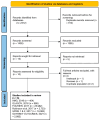Safety and Efficacy of Achieving Very Low LDL Cholesterol Concentrations with PCSK9 Inhibitors
- PMID: 40648946
- PMCID: PMC12249667
- DOI: 10.3390/jcm14134562
Safety and Efficacy of Achieving Very Low LDL Cholesterol Concentrations with PCSK9 Inhibitors
Abstract
Background: The advent of newer pharmacological agents, particularly proprotein convertase subtilisin/kexin type 9 (PCSK-9) inhibitors, in combination with conventional lipid-lowering treatments, has allowed for the significant lowering of low-density lipoprotein cholesterol (LDL-C). However, it is unclear if very low LDL-C levels achieved with the use of PCSK-9 inhibitors are associated with increased adverse events that may outweigh potential benefits. Methods: A systematic search of PubMed, Medline, and Cochrane databases was conducted from their inception to 21 February 2025, for randomized controlled trials (RCTs) reporting clinical outcomes with intensive lipid-lowering treatment with PCSK-9 inhibitors leading to very low (<40 mg/dL) LDL-C levels vs. a control group with higher LDL-C levels. The outcomes of interest included the incidence of major adverse cardiovascular events (MACEs), neurocognitive disorders, diabetes mellitus, muscle disorders, any adverse events, events leading to drug discontinuation, cataract, hepatobiliary disorders, and cancer. Random effects meta-analysis models were used to calculate the pooled incidence and odds ratio (OR) with 95% confidence intervals (Cis). Results: A total of six RCTs with 52,951 patients (11,209 very low LDL-C, and 41,742 control) met the inclusion criteria. Compared with patients in the control arm, very low LDL-C was associated with a reduction in MACEs (OR = 0.76, 95% CI: 0.64, 0.89; p < 0.01; I2 = 44.8%). The incidence of most safety outcomes including neurocognitive disorders, diabetes mellitus, muscle disorders, any adverse events, events leading to drug discontinuation, cataract, hepatobiliary disorders, and cancer were comparable between the very low LDL-C and control groups. Conclusions: Very low LDL-C values following intensive lipid-lowering with PCSK-9 inhibitors are associated with a major reduction in cardiovascular events without any significant increase in serious side effects.
Keywords: PCSK9 inhibitors; adverse events; major adverse cardiovascular events; very low LDL.
Conflict of interest statement
The authors report no conflicts of interest to declare.
Figures



References
-
- Ference B.A., Ginsberg H.N., Graham I., Ray K.K., Packard C.J., Bruckert E., Hegele R.A., Krauss R.M., Raal F.J., Schunkert H., et al. Low-density lipoproteins cause atherosclerotic cardiovascular disease. 1. Evidence from genetic, epidemiologic, and clinical studies. A consensus statement from the European Atherosclerosis Society Consensus Panel. Eur. Heart J. 2017;38:2459–2472. doi: 10.1093/eurheartj/ehx144. - DOI - PMC - PubMed
-
- Borén J., Chapman M.J., Krauss R.M., Packard C.J., Bentzon J.F., Binder C.J., Daemen M.J., Demer L.L., Hegele R.A., Nicholls S.J., et al. Low-density lipoproteins cause atherosclerotic cardiovascular disease: Pathophysiological, genetic, and therapeutic insights: A consensus statement from the European Atherosclerosis Society Consensus Panel. Eur. Heart J. 2020;41:2313–2330. doi: 10.1093/eurheartj/ehz962. - DOI - PMC - PubMed
Publication types
LinkOut - more resources
Full Text Sources
Miscellaneous

